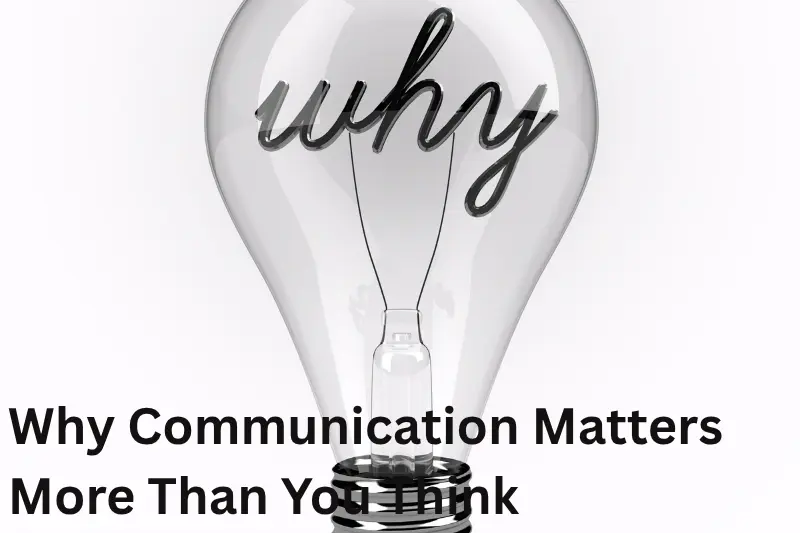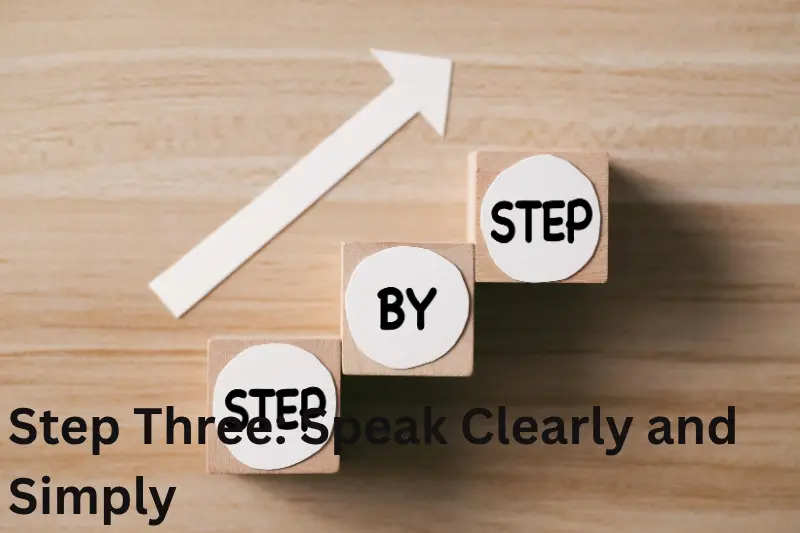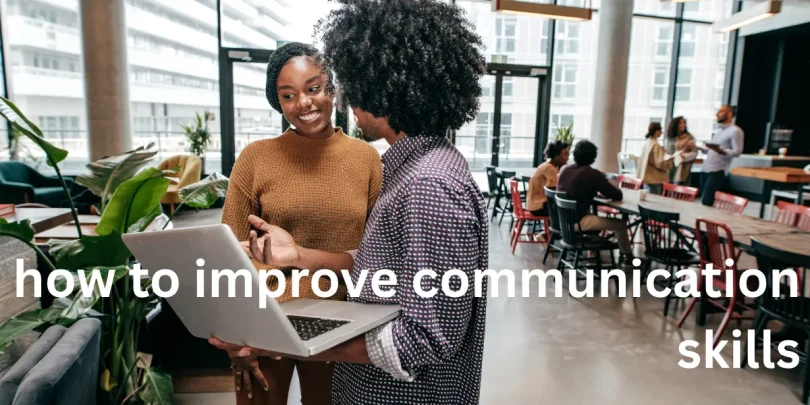Let’s be honest—talking to people sounds easy, right? But when it actually comes to expressing ourselves clearly, things can get awkward fast. You try to explain something, and suddenly your mind goes blank. Or maybe you’re in a group conversation and can’t seem to jump in at the right time. You might even overthink every word later, replaying what you said and wondering if you sounded weird. Yep, we’ve all been there. That’s why learning how to improve communication skills isn’t just about speaking better—it’s about connecting better, feeling confident, and making real human connections without the stress. The good news? Communication isn’t a talent you’re either born with or not—it’s a skill you can build, polish, and master over time. And the best part? You can start improving today, even with small, simple changes. So, let’s talk about how you can go from feeling unsure to communicating with confidence in every situation that matters—whether it’s at work, school, or even at home.
Why Communication Matters More Than You Think

Communication is one of those invisible superpowers that quietly shape every part of your life. It’s in how you talk to friends, handle disagreements, make new connections, or even share ideas that could change your future. When you communicate well, you feel heard, understood, and respected. When you don’t, it’s easy to feel overlooked, frustrated, or misunderstood. Think about it—you could be incredibly smart or talented, but if you can’t express your thoughts clearly, people might never see your full potential. Communication bridges that gap. It’s the difference between getting your point across and getting your point understood. In your career, it opens doors to opportunities; in your relationships, it creates stronger emotional bonds. And here’s a truth we often forget—good communication isn’t about talking more, it’s about connecting more.
Step One: Understand Your Communication Style
Before you can improve, you need to know how you currently communicate. Everyone has a unique style—some people are bold and direct, others are more reflective and gentle. Neither is better; what matters is awareness. Ask yourself: do you talk too much without listening? Do you stay quiet because you fear saying something wrong? Do you often misinterpret what others mean? Taking time to reflect helps you understand your habits and where they may be holding you back. Awareness creates space for change. When you recognize your default patterns, you can adjust them intentionally. Maybe you need to pause more when you speak, or maybe you need to express yourself more openly. The first step to mastering communication is simply noticing how you already communicate.
You may also like to read these articles
Unlock Your Potential with the Best Skill Development Courses Online
Unlock Your Potential with Practical Skill Development Programs
Unlock Future Success with Skill Development for Students
Transform Your Career with Expert Professional Skill Building Tips
Unlock Your Confidence: how to improve communication skills Fast
Step Two: Listen—Really Listen
Here’s the deal: the best communicators aren’t always the ones who talk the most—they’re the ones who listen the best. Listening is more than hearing words. It’s about paying attention, understanding emotions, and responding thoughtfully. Most of us listen to reply, not to understand. We wait for our turn to speak rather than genuinely caring about what’s being said. To improve this, focus on the person speaking—put your phone down, look at them, and absorb their message. Don’t interrupt. Nod, ask follow-up questions, and paraphrase their main points to show understanding. Listening well makes others feel valued and respected. It builds trust and deepens relationships. In every conversation, remind yourself that listening is just as powerful as speaking.
Step Three: Speak Clearly and Simply

You don’t have to sound like a motivational speaker or use complicated words to impress people. The goal of good communication is clarity, not complexity. When you speak, choose words that are simple and meaningful. Before you open your mouth, take a brief moment to think about what you really want to say. This short pause helps you stay organized and reduces filler words like “um,” “you know,” or “like.” Keep your sentences short and your tone natural. Speak as if you’re talking to a close friend, even in formal situations. When you’re genuine, people listen. The truth is, confidence doesn’t come from speaking perfectly—it comes from speaking authentically.
Step Four: Pay Attention to Body Language
Sometimes, your body says more than your words ever could. Your posture, facial expressions, gestures, and tone of voice send signals that influence how others perceive you. If you say “I’m fine” while looking away and crossing your arms, people will know you’re not. Open body language—standing tall, maintaining gentle eye contact, and using natural gestures—makes you appear approachable and confident. Avoid slouching or fidgeting, as these can make you seem nervous. Remember, communication isn’t just verbal—it’s visual too. When your body language matches your words, your message feels more believable and powerful.
Step Five: Manage Nervousness and Fear
Feeling nervous when you speak is totally normal. Even experienced speakers get butterflies sometimes. The key isn’t to eliminate fear—it’s to manage it. Preparation is your best friend. If you’re heading into an important talk or presentation, know your points inside out. Practice until you feel comfortable. Before speaking, take deep breaths to calm your mind. Focus on your message, not on what people might think of you. Remind yourself that small mistakes are human and that people care more about your message than your delivery. Over time, you’ll notice your confidence grow naturally with every new conversation you face.
Step Six: Practice Empathy
Communication isn’t a solo act—it’s a connection between people. That’s where empathy comes in. Empathy means trying to understand the feelings, thoughts, and experiences of others. When you approach conversations with empathy, you shift your focus from “How do I sound?” to “How can I understand this person better?” You begin to respond with kindness instead of defensiveness. You start to notice what people aren’t saying, not just what they are. This doesn’t mean you have to agree with everyone—it means you value their perspective. Empathy helps build bridges in communication that words alone can’t.
Step Seven: Improve Your Vocabulary Naturally
Having a good vocabulary helps you express yourself more clearly, but that doesn’t mean memorizing fancy words. The best way to grow your vocabulary is through exposure. Read books, watch shows, and listen to people who communicate well. Pay attention to how they phrase ideas or describe feelings. When you learn a new word, use it in a natural sentence rather than forcing it. Over time, your speaking and writing will naturally become more fluid and expressive. Remember, vocabulary is not about showing off—it’s about being understood.
Step Eight: Practice Every Day
You can’t improve communication overnight—it takes consistent practice. Luckily, practice opportunities are everywhere. Start small. Talk to people in line at the grocery store, ask your classmates questions, or share ideas in team meetings. You can also record yourself speaking about a topic, then listen back to evaluate your tone, clarity, and pacing. The more you practice, the more comfortable you’ll become. Every conversation, no matter how small, is a chance to sharpen your skills.
Step Nine: Handle Conflicts Gracefully
Conflict is a natural part of communication. What separates strong communicators from the rest is how they handle disagreements. When tempers rise, stay calm. Listen to the other person’s viewpoint before responding. Avoid using harsh or blaming language. Instead of saying “You always do this,” try “I feel frustrated when this happens.” This small shift changes the tone from confrontation to cooperation. Focus on finding solutions instead of proving who’s right. A calm and respectful approach can turn conflicts into opportunities for understanding and growth.
Step Ten: Stay Open to Feedback
Feedback can feel uncomfortable, but it’s one of the fastest ways to improve your communication. Ask people you trust—friends, mentors, or colleagues—how you come across when you speak. Maybe you talk too fast, or maybe your tone sounds harsher than you realize. These insights are valuable. Instead of taking feedback personally, treat it as data that helps you grow. Small tweaks can lead to big improvements. Being open to feedback shows maturity and a willingness to evolve.
Step Eleven: Build Confidence in Social Situations
If you find social interactions intimidating, remember that confidence is built through repetition. Start with small interactions—greet people, smile, and make casual small talk. Ask open-ended questions that invite others to share their thoughts. Finding common ground, like shared interests or experiences, makes conversations flow naturally. Don’t worry about awkward pauses—they happen to everyone. Over time, you’ll find yourself enjoying social moments that once felt stressful. Social confidence doesn’t come from being extroverted—it comes from being authentic.
Step Twelve: Learn to Adapt
Different settings call for different communication styles. The way you talk to your manager won’t be the same as how you talk to your sibling. This is where adaptability matters. Pay attention to tone, formality, and emotional cues from the person you’re speaking to. Adapting your style doesn’t mean being fake—it means being emotionally intelligent. When you adjust your approach to fit your audience, your message lands more effectively.
Step Thirteen: Communicate with Purpose
Before you speak, ask yourself what you want to achieve. Do you want to inform, persuade, or connect? Having a clear goal helps you stay focused and intentional. It also keeps you from saying unnecessary things that could confuse your listener. When your purpose is clear, your communication becomes more powerful and memorable.
Step Fourteen: Embrace Silence
Silence isn’t awkward—it’s powerful. Pauses allow people to process what’s been said. They give space for reflection and understanding. When you learn to embrace silence, you appear more thoughtful and confident. Don’t rush to fill every quiet moment with words. Sometimes, what isn’t said carries just as much weight as what is.
Step Fifteen: Keep Growing
Communication isn’t a skill you master once—it’s something you keep refining throughout life. Every new experience teaches you something about how people think, feel, and connect. Stay curious. Watch how great communicators handle themselves. Keep learning, practicing, and evolving. Over time, you’ll notice that your conversations become more meaningful and your relationships stronger.
Conclusion: You’ve Got This
Here’s the truth—becoming a better communicator isn’t about being perfect. It’s about being real. Every mistake you make is a lesson. Every conversation is a chance to grow. You don’t need to sound like anyone else; you just need to express yourself with honesty and clarity. Start small. Speak kindly. Listen deeply. Be patient with yourself because progress takes time. Communication is not just about words—it’s about connection, understanding, and emotion. When you communicate from the heart, people listen. So, go ahead and take that first step today. You already have what it takes to master how to improve communication skills.
Quick Actionable Checklist
Reflect on how you currently communicate and identify your strengths and weaknesses. Practice active listening daily by focusing fully on the speaker. Keep your body language open, confident, and natural. Speak clearly, using short and simple sentences. Manage your nervousness with deep breathing and preparation. Handle conflicts calmly and respectfully. Keep learning new words to express yourself better. Stay open to feedback, and practice every chance you get. Finally, remember that communication is about connection—so speak from the heart, and everything else will follow naturally.
FAQs
Why is it important to learn how to improve communication skills?
Because strong communication helps you express ideas clearly, build better relationships, and create more opportunities in both personal and professional life.
What are the first steps to start improving communication skills?
Begin by listening more, maintaining eye contact, and practicing speaking clearly and calmly every day.
Can communication skills really be learned or are they natural?
They can absolutely be learned. With daily practice and feedback, anyone can become a confident communicator.
How can I overcome shyness while improving my communication skills?
Start small — talk to familiar people, practice positive body language, and slowly push yourself into group discussions.
What are some quick exercises to improve communication skills?
Try mirror speaking, recording your conversations, reading aloud, and joining social or public speaking clubs for real-world practice.








